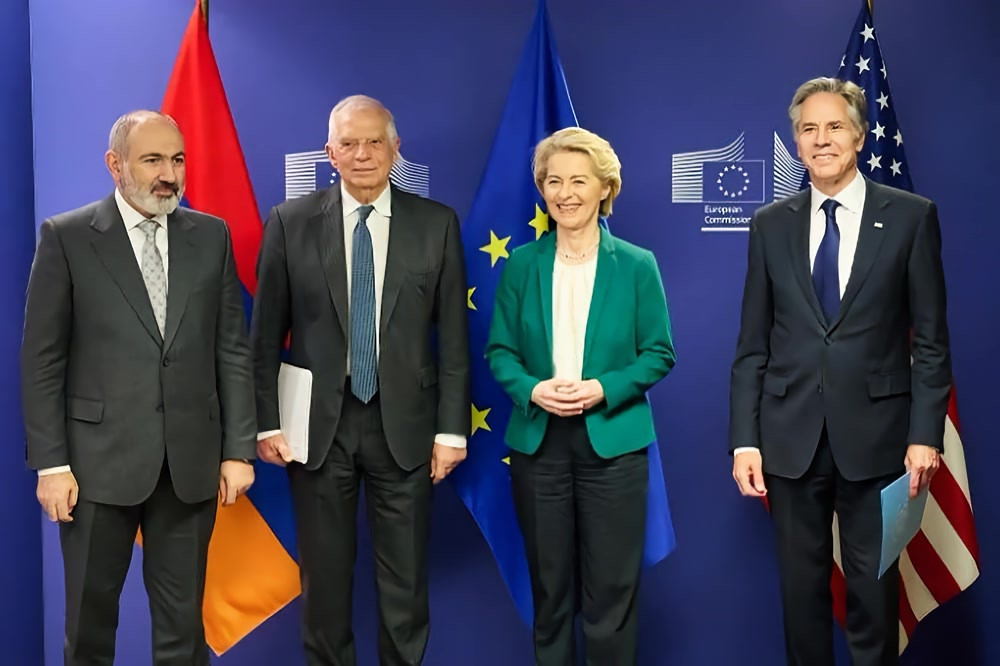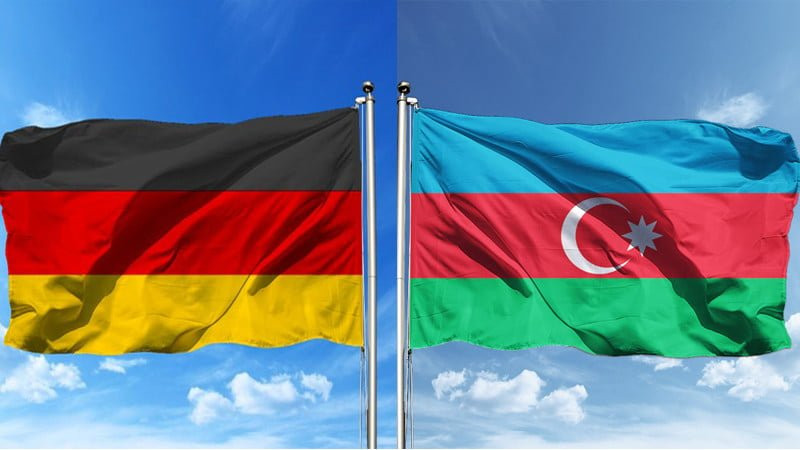On April 5, an EU-Armenia-U.S. trilateral meeting was held between European Commission President Ursula von der Leyen, Armenian Prime Minister Nikol Pashinyan and U.S. Secretary of State Antony J. Blinken. EU High Representative/Vice-President, Josep Borrell and USAID Administrator Samantha Power also attended the meeting. The meeting with the purpose of supporting Armenia was announced by President von der Leyen last year after a bilateral meeting with PM Pashinyan in Granada on October 5.
Prior to the meeting, Armen Grigoryan, Secretary of the Security Council of Armenia stated that the event aims to strengthen Armenia’s resilience. In the U.S. Department of State’s press statement, the objective of meeting was further specified by indicating that it relates to the U.S. and EU support for Armenia’s economic resilience as it works to diversify its trade partnerships and address humanitarian needs.
After the meeting, Von der Leyen announced a Resilience and Growth Plan for Armenia for 2024-2027, specifying that the 270 million euros will be allocated in grants over the next four years. The promised fund also includes over 65 million dollars from the United States. The aid package mainly covers EU’s support for Armenia’s small and medium-sized businesses, its contribution to the diversification of exports and investment in key infrastructure projects. The new support package, according to Von der Leyen, builds on the existing Economic and Investment Plan from the EU for Armenia.
It appeared that this meeting was being watched with particular sensitivity and concern in Russia and Armenia’s neighborhood. This was not overlooked in the statements of Russian officials. Russian Foreign Ministry Spokeswoman Maria Zakharova wrote in her Telegram channel that the Armenia-EU-U.S. meeting scheduled for April 5 is causing Moscow’s concern as Washington and Brussels are openly discussing its anti-Russian orientation. She added that such meetings enable the West with its extremely destructive approaches to gain a firmer foothold in the South Caucasus. Zakharova harshly criticized Armenia for being turned into a tool for the implementation of extremely dangerous plans of the collective West, which, according to her, completely disagree with the fundamental interests of the Armenian people.
Accusing Yerevan, Russian Foreign Minister Sergei Lavrov also stated that the situation in relations between Armenia and Russia does not inspire optimism due to the position of the Armenian leadership, which is deliberately destroying relations with the Russian Federation. Chairman of the Federation Council Committee on International Affairs Grigory Karasin said that they are attentively monitoring all statements by Armenia.
The Russian Ambassador to Armenia Sergei Kopyrkin emphasized that this situation is dangerous and could have a detrimental effect on Russian-Armenian relations. The Russian MFA’s statement after the trilateral meeting is also quite remarkable in this sense. It again says that the meeting in Brussels is another attempt to drag the South Caucasus into geopolitical confrontation.
On April 4, Türkiye’s Foreign Ministry also issued a statement about the Armenia-EU-U.S. trilateral meeting. Türkiye called on “third countries to take into account the parameters of the region and to approach the parties to the conflict from a position of equal distance,” saying Azerbaijan’s exclusion would undermine the neutral approach to the region’s complex problems and could fuel geopolitical confrontation.
Iran also warned Armenia on “turning the South Caucasus into an arena of geopolitical competition by extra-regional powers.” In the latest remarks made by Iran’s Foreign Ministry spokesman Nasser Kanani on April 10, the importance of regional cooperation to establish peace and stability in the Caucasus was particularly underlined. Recall that during Armenian Defense Minister Suren Papikyan’s visit to Iran last month, Iranian President Ebrahim Raisi delivered a firm message by saying “allowing outsiders to interfere will not bring security; security and peace will be guaranteed only by the cooperation of the countries of the region themselves.”
In his turn, Azerbaijani Foreign Minister Jeyhun Bayramov previously expressed concern over the April 5 meeting. During the meeting with an ambassador on special assignments of the Russian Foreign Ministry Pavel Knyazev, Bayramov stated that countries far from the region are hindering Armenian-Azerbaijani normalization. Before that responding to a question about the potential effect of this meeting on the ongoing peace process in the region, Azerbaijan’s MFA Spokesperson Aykhan Hajizada explained that this conference is not conducted in a fully transparent manner, lacks regional inclusivity and creates new dividing lines and so-called spheres of influence in the region.
Some media outlets in Azerbaijan and Armenia leaked information ahead of the conference that, the U.S. and the European Union were preparing to sign a pact that provides security for Armenia. However, this was rejected by the EU officials. EU Lead Spokesperson for Foreign Affairs and Security Policy Peter Stano pointed out that there appeared to be a misunderstanding about the trilateral meeting. He claimed that the meeting will not be focused on “security guarantees,” but would address issues of the EU/U.S.-Armenia bilateral agenda.
Curiously enough, in advance of the meeting, Antony Blinken and Ursula von der Leyen both made phone calls to the President of the Republic of Azerbaijan Ilham Aliyev and tried to reassure him that the aforementioned meeting will exclusively focus on Armenia’s economic development issues and was not aimed against Azerbaijan. In response to the American Secretary of State, President Aliyev accentuated he had information that the issues such as military support for Armenia, joint military exercises, the establishment of military infrastructure along border areas with Azerbaijan, and Armenia’s armament through the EU’s European Peace Facility will be among the topics discussed.
He also noted that “non-transparent preparation, lack of inclusivity…would ultimately escalate tensions and create new dividing lines instead of fostering peace and cooperation in the South Caucasus.” During the conversation with EC president, regarding the trilateral meeting, Ilham Aliyev again underlined the need for regional inclusivity.
Apparently not assured of these clarifications by Blinken and Von der Leyen, during the meeting with Mevlüt Çavuşoğlu, former Foreign Minister of Türkiye, the Azerbaijani president went even further and said that “we interpret this as being against Azerbaijan and cooperation in the South Caucasus. Its aim appears to be the establishment of divisive lines and the isolation of our country.”
As we see it, the Azerbaijani side has particularly had feelings of concern about the trilateral meeting based on the recent history that Armenia might try to use deceitfully its alliance and return back to the past policy of aggression. The U.S.-EU-Armenia meeting held on April 5 is therefore understandably viewed from this perspective by Azerbaijani public. Besides, the phone calls by Antony Blinken and Ursula von der Leyen should, in general, be evaluated positively as taking Azerbaijan’s concerns into consideration.
Furthermore, it seems that Armenia wants to be provided with a full security guarantee in return for a pivot to the West. The Armenian government obviously falls into delusions that a new and more promising military-political situation is emerging for Armenia, and the U.S. and the EU will support Armenia against Azerbaijan in any armed escalation. But, to achieve a security guarantee, Armenia is trying to falsely create the image of a security risk originating from Azerbaijan.
Fabricated claims about “new war preparations” by Azerbaijan are the latest illustrations of this development. This situation can unfavorably further encourage Yerevan to evade the agreements regarding the peace deal. Most likely, the main reason for the persistent avoidance of the final peace agreement by the Pashinyan government in recent times is hidden at this point. It is clear, though, that this is a matter of concern to Azerbaijan. However, it appears from the statements of the officials of the EU and the U.S. that they hesitate to provide security guarantees to Armenia, therefore they only emphasize economic support.
Overall, this can be considered a heavy blow to the regional peace process as specified above. Far from being a coincidence, all these gave an internal resonance to the radical groups in Armenia recently. Today, however, the main factor for the potential military tension in the South Caucasus is the lack of a bilateral peace agreement between Armenia and Azerbaijan. Apparently, favorable opportunities to achieve peace emerged over the past three years and they cannot be missed over and over again.
To sum up, Armenia has presumably chosen to become a bridgehead for the U.S.-Russia confrontation in the South Caucasus. Yerevan is determined to play both sides, on the one hand, seeking a security guarantee from the West, and on the other hand, continuing as a member of Russian-led economic and security organizations. As such, Armenia’s approach obviously does not promise a peaceful future in the era of rivalry. Any further intensification of the geopolitical competition will undoubtedly bring challenges for every nation of the region and its neighborhood. This would calamitously turn the South Caucasus region into a theater of the conflict between great powers.
In a nutshell, the three of four neighbors of Armenia, plus its strategic ally, Russia expressed their concerns and firmly opposed the EU-Armenia-U.S. high-level meeting. Armenia’s search for new alliances in the West will probably follow the deterioration of its relations with those countries in the greater degree in the short and medium term. Simultaneously, the above mentioned meeting can be a starting point in bringing Yerevan’s partnership with the West to a qualitatively new level and impact on wider regional realignments in the long run overall.
https://www.neglobal.eu/eu-armenia-u-s-high-level-meeting-a-critical-moment-for-the-south-caucasus/






